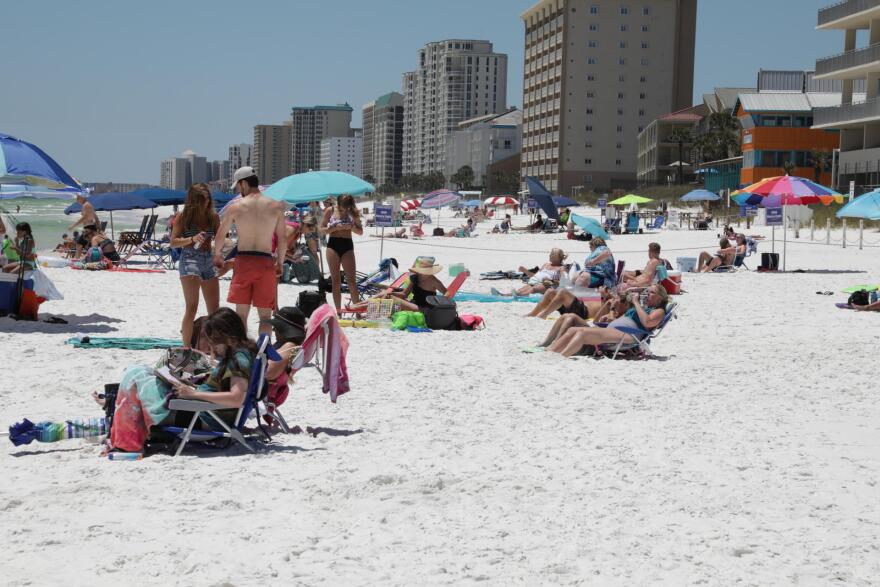At the height of the summer tourist season, Florida’s largest cities and counties are closing beaches, ordering masks to be worn, and stopping business reopenings because of a jump in coronavirus.
“When we saw those first 9,000 cases pop up at the end of last week, that was a warning sign or red flag to a lot of us that we were sort of already at that point of its gotten worse,” said Dr. Cindy Prins, an epidemiologist and medical professor at the University of Florida.
And she’s warning that things, in fact, are likely to get worse before they get better.
“The thing you have to consider is when you had that level of cases, that a level of transmission in your community that is well beyond what we want to be seeing,” said Prins. “And it’s also a concern because of the level of potential asymptomatic cases that are in the community that go along with that.”
As of Wednesday, the Florida Department of Health reported almost 159,000 cases across Florida; a nearly 6,600 increase from Tuesday, with 45 deaths related to COVID-19. On Thursday, the state broke another daily record with 10,109 confirmed cases. Prins believes reopening bars and other gathering places was a bit premature -- in part because of relaxed socializing.
“You may be sitting with a group that you know, but you may be interacting with people you don’t know, that may be from outside of your household,” said Prins. “And obviously in a bar then you add the fact that people want to mingle. They’re not wearing a mask, and you’re spending a long period of time together. That right there really adds up to a higher risk of infection.”
In his chat on Facebook Wednesday, Pensacola Mayor Grover Robinson addressed the rising COVID numbers, and reiterates his stance that — despite the jump in cases — closings are not necessary in Pensacola.
“At this particular time, we have 77 hospitalizations; to put this in perspective, we were only at 36 a week before that and 2 weeks ago we were at 17,” said Robinson.
The mayor keeps in constant touch with officials at Sacred Heart, Baptist and West Florida hospitals, who are solidly behind the new emergency ordinance requiring face coverings inside buildings that are inside the city limits. He shared that opinion from the CEO of Baptist.

“Mark Faulkner told me, ‘if we all wear masks, in three weeks we could knock this thing back to where it was,’” said Robinson. “’We don’t have to close businesses; we just need to have everyone wear a mask.’ If we wear a mask, the ability for [coronavirus] to transmit significantly falls off, and we defeat the virus.”
The mask ordinance, says Robinson, is aimed at fighting the number of new cases – which he says is “starting to get out of control.”
“We have to do some measures; we have to take some responsibility ourselves,” said the mayor. “It is on all of us to do this. I don’t ask you to like it; I ask you simply to respect it and to try to work with us on this.”
What we’re seeing now in the coronavirus surge, says Dr. Cindy Prins at the University of Florida, actually began about two weeks ago.
“It takes at least two weeks; there’s transmission, there’s time for symptoms to develop, there’s time for people to get tested and getting identified as having COVID,” Prins said. “And within that whole period of time, they may be transmitting to other people.”
When these cases began showing up in June, that was the time, contends Prins, everybody should have ratcheted up their concern – especially when the increase gained speed in the second week of June.
“That’s when we really should have been reacting more quickly to say, ‘What is it? What’s going on? That we’re seeing this rise in cases,’” said Prins. “And ‘is it, and how is it related to the [reopening] of the state?’”
Looking ahead to July, the goal remains keeping Floridians safe as the pandemic runs its course. But July 4th weekend — the reopening of Disney World, and the Republican National Convention in Jacksonville — add to that already formidable challenge. Prins says ask yourself one question if you plan to go out to an event,
“What is the risk of me getting infected? Make an assumption that someone at that place or event has COVID-19,” said Prins. “And take the precautions that will either prevent you from getting infected while you’re there, or make a decision that it’s just not worth the risk and don’t go.”
Meanwhile, Escambia County is down to just three adult intensive care unit beds, as the number of people hospitalized for COVID-19 has doubled in the last week, according to a report by the Pensacola News Journal, citing the latest figures from the Florida Agency for Health Care Administration and the city of Pensacola.

